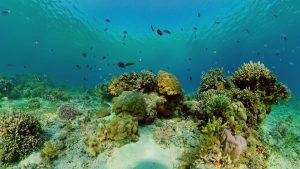The Philippine government says that it plans to “validate and investigate” reports from Filipino fisherfolk that their Chinese counterparts are using cyanide to catch fish at the disputed Scarborough Shoal in the South China Sea.
At a press conference on Saturday, Nazario Briguera, a spokesperson for the Bureau of Fisheries and Aquatic Resources (BFAR) alleged that Chinese fishermen had been using the toxic chemical at the shoal, which Manila refers to as Bajo de Masinloc.
“These Chinese fishermen use cyanide,” said Briguera, according to a translation of his comments in the Philippine Star. “[T]hey intentionally destroy Bajo de Masinloc to prevent Filipino fishing boats to fish in the area.”
National Security Council (NSC) spokesperson Jonathan Malaya said yesterday that the National Task Force for the West Philippine Sea has instructed BFAR to “complete the documentation” of the reported cases of cyanide fishing so the Philippines could “investigate,” according to a report by Rappler. He said that the NSC was “alarmed” by the reports, but emphasized the need to be “careful,” given the recent tensions with China in regions of the South China Sea claimed by both nations.
Once the incident is confirmed, Malaya told the Philippine News Agency that the Taskforce will refer the matter to the Office of the Solicitor General and the Department of Justice “to determine if there’s prima facie evidence of wrongdoing and who’s responsible.”
“Our lawyers will take it from there,” he added.
Cyanide fishing is a controversial method of fishing that involves the use of a sodium cyanide mixture in order to incapacitate fish. According to the World Wildlife Fund (WWF), the chemical stuns the fish without killing it, making it easy to catch in a net, or even by hand.
Somewhat ironically, the practice began in the Philippines in the 1960s as a means of supplying the international aquarium trade, according to the WWF. “But since the early 1980s, a much bigger business has emerged: supplying live reef fish for the restaurants of Hong Kong, Singapore, and, increasingly, mainland China.” Cyanide fishing, which can cause coral bleaching or even kill coral outright, is illegal in many of the countries in which it is practiced, although these laws are often minimally enforced.
If the allegations are true, the use of such chemicals is probably driven by commercial imperatives – but the growing tensions between China and the Philippines in the South China Sea give such claims an added degree of sensitivity.
Scarborough Shoal lies around 198 kilometers due west of Luzon, well within the Philippines’ internationally recognized exclusive economic zone. But the triangular shoal fell under China’s control after a 10-week stand-off with the Philippines in 2012 and the China Coast Guard (CCG) has maintained a nearly permanent presence at the shoal in the 11 years since.
A key point of contention since then has been access by Filipino fishermen to the shoal. In September, CCG vessels erected a floating barrier across the entrance to the shoal’s lagoon, in order to prevent access by fishermen from Luzon, “depriving them of their fishing and livelihood activities.” The barrier was later removed by the Philippine Coast Guard.
After Saturday’s claim by BFAR, the Chinese embassy in the Philippines described the cyanide allegations as “totally baseless and sheer fabrication.”
“The Chinese Government attaches great importance to the protection of the ecological environment and conservation of fishery resources, and have taken resolute measures to crack down on any illegal fishing activities,” the mission said.
While it remains unclear whether and to what extent cyanide has been used at the shoal, the claim highlights an understated element of the South China Sea disputes: the immense impact that land reclamation, fishing, and military deployments is having on the region’s fragile marine ecosystems.

































